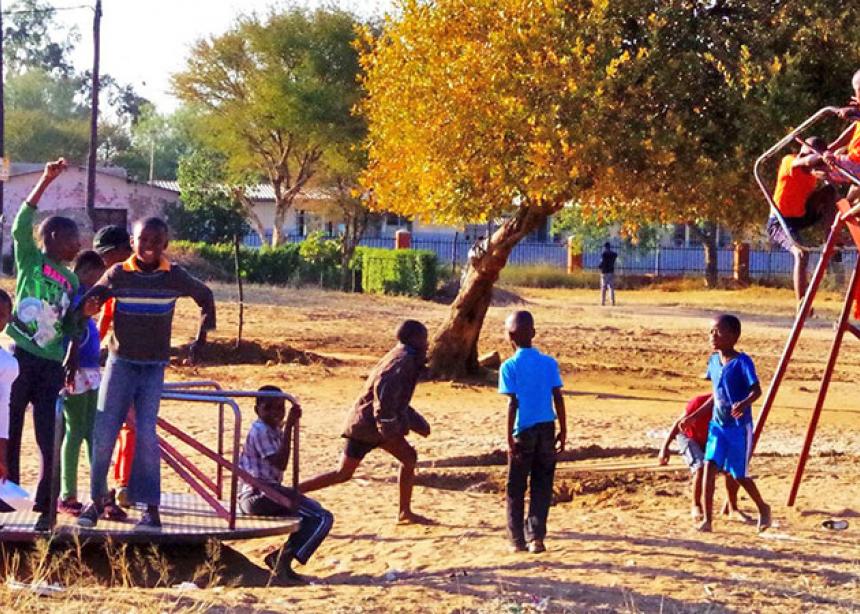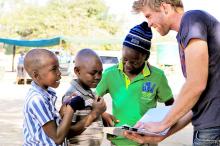When entering Bontleng in Botswana’s Gaborone Region from the southeasternmost road you find yourself passing tall grass, wrought-iron covers and headstones of a large cemetery. As the road curves to the left around the nearby Zion Christian Church compound, just before three drinking establishments on the right that are marked by stacks of bottle crates, you find an open, dusty plot of land crisscrossed by a steady stream of pedestrians.
On maps it’s marked as a green space, although it’s decidedly brown. Industrious entrepreneurs set up competing carwashes on its perimeter. You can get your vehicle washed by hand and bucket, and swept and polished, for a reasonable $5.50, although you need to be careful as you drive out not to kick up dust and sully their work. A middle-aged man sits beside his wheelchair in the far corner of the space under a drooping stretch of shade netting, mending shoes. A thorny wait-a-bit tree near the middle of the property grows beside a shack housing a barber, where local men sit and visit outside in the shade.
Residents in nearby houses tell us that a stabbing recently occurred in the park as two men fought behind the bars one evening. Many locals have been robbed of cell phones and money while crossing through the area at night, the darkness hiding assailants who wait for the inevitable foot traffic. Abductions of children for the use of the sangoma—traditional doctors—are not unheard of, as certain politicians seek extra good luck during election season.
In the middle of this picture is a playground. Day and night, children love to play on the metal playground equipment, placed there haphazardly many decades ago. But every single swing is broken, with a few chains left hanging at awkward lengths. The jungle gym teeters dangerously; some of its legs are rusted off near the base, while a few are bent from the impact of a careless driver. The rusted slides have gaping and jagged holes, and can’t be used except to scramble up and down; children do this each day, still wearing their blue and grey school uniforms as they pause for some fun.
As children grow into youths, the playground loses its appeal and the focus shifts to the surrounding bars. Neighbourhood action occurs there nightly from Thursday to Sunday every week, drawing crowds of all ages. A recent stabbing was not an isolated incident. Neither are the frequent thefts and assaults that happen both to and by patrons of these establishments.
Bontleng, incidentally, is Setswana for “place of beauty.”
When Taryn, my wife, and I first arrived two years ago, we began to envision ways that such places could be transformed. The possibilities seemed endless. Recently, we began a project in earnest.
We measured some areas, wrote proposals, made sketches, got to know people on Gaborone’s city council, and officially asked permission to use some of the land. Almost a year later, we received notice that we were welcome to make use of this sketchy park in the middle of the “place of beauty.” Soon after we received the necessary permits, we were off and running with youth and young adults in our Bible study and community service projects, playing soccer together, sharing meals and growing as a community of believers from various churches, as well as from the community beyond.
With our youth, we spend time learning from Jesus that God’s Word is there for us to know and love. And in learning to know and love God’s Word, we explore ways to enact what we’re shown, which is creative, loving, unexpected service of each other.
The people of Botswana love football—what we call soccer—but there isn’t really any football development in the country. So we initiated a project to give children a safe place that can also be used by youth and adults who might otherwise be drawn toward the bars.
With a group of young adults from Spiritual Healing Church and some youth from the surrounding area, Taryn and I are building Botswana’s first futsal court. Futsal is five-a-side football, and is played in many of the best football nations. Fast-paced, skill-developing, easy to play and fun to watch, futsal is played on a surface about the same size as a basketball court. We’re hoping to use a hard synthetic surface that will be safe and will also last for decades.
Our team is also rebuilding the children’s beloved playground, recycling, repairing and repainting pieces that can be salvaged, and building new structures of our own design.
Under a tree beside the court and the playground, we’re installing a brick patio and the semicircular log fencing of a kgotla, a traditional place of meeting for elders, as well as crafting Muskoka chairs out of wood recycled from old skids to arrange around it. We’re trying to garner donations of hardy trees to beautify the space and create shade, as well as concrete bus shelters for team benches. Around the fenced-in futsal court we will place stadium lighting. We’re hoping that solar panels will be donated to power them, since we get well over 300 days of intense sun annually; they will also light up the surrounding park at night and make it a safer environment.
There are a number of other concepts our team has come up with to make the whole place interactive and profitable for the community, including using it as a recycling centre, a rarity in Gaborone. Recycling could generate income for maintenance and security. By building stalls and fixing up the ones already in use by the cobbler, barber and car washers, we could attract food vendors and more small local businesses selling furniture of recycled wood, locally made T-shirts and hoodies, and crafts.
Peter Butler, a former English Premier League football player and the new coach of Botswana’s beloved but unsuccessful national football squad, the Diamond Zebras, has expressed his support for this project, giving us his official endorsement to show to the businesses we are approaching for sponsorships. He’s also stated his intention to bring out the national team for the eventual launch event. Even better, he is interested in helping to provide football development for the program we intend to establish for kids and youth once the court is in place.
The beauty of a place like Bontleng is reflected in the people who live and meet here, who see and envision more in the land and in the people around them. When Jesus-loving individuals come together as a community to serve their neighbours, there is a reality to the words of Jesus: “You are the light of the world. A town built on a hill cannot be hidden. Neither do people light a lamp and put it under a bowl. Instead, they put it on its stand, and it gives light to everyone in the house. In the same way, let your light shine before others, that they may see your good deeds and glorify your Father in heaven” (Matthew 5:14-16).
The darkness of the park that allows weak individuals to target strangers and neighbours alike with violence and fear is no match for the light of Jesus, reflected by God’s people in Gaborone.
Nathan and Taryn Dirks of Niagara United Mennonite Church, Niagara-on-the-Lake, Ont., are MC Canada Witness workers in Gaborone, Botswana.
To view of a video of the Dirks’s work in Botswana, visit http://bit.ly/1v6eHUB.
--Posted Nov. 19, 2014

Day and night, children love to play on the metal playground equipment, placed there haphazardly many decades ago. . . . The rusted slides have gaping and jagged holes, and can’t be used except to scramble up and down; children do this each day, still wearing their blue and grey school uniforms as they pause for some fun. (Photo: Nathan Dirks)



Add new comment
Canadian Mennonite invites comments and encourages constructive discussion about our content. Actual full names (first and last) are required. Comments are moderated and may be edited. They will not appear online until approved and will be posted during business hours. Some comments may be reproduced in print.